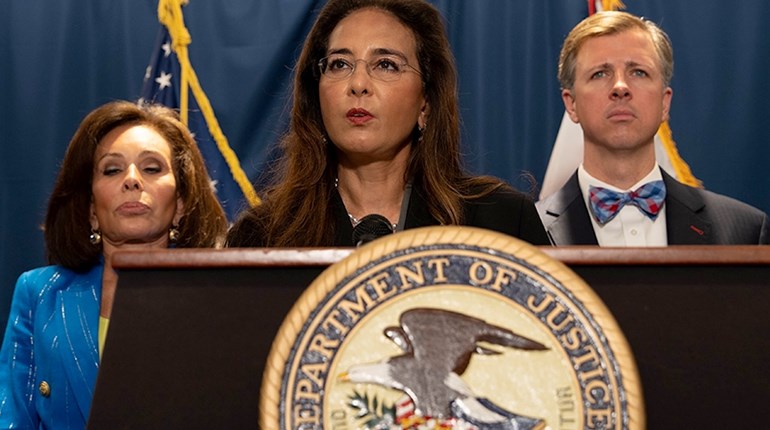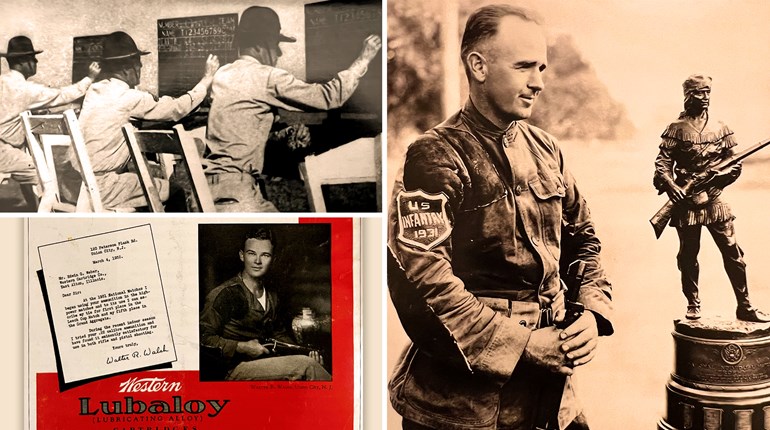
Donald Trump, with NRA members’ support, scored a monumental political comeback in November. Not only did he retake the White House, but he will also preside over pro-gun majorities in both chambers (likely at the time of this writing) of Congress. I discuss elsewhere in these pages how President Trump’s win can directly benefit gun owners.
Here, however, I would like to focus on a story that emerged in the closing days of the election as a parable of what was at stake.
The contest had already been one of the most turbulent in American history. The Democrat Party had tried to demonize, impoverish and disqualify Donald Trump with a coordinated campaign of unbridled propaganda and lawfare. The Biden-Harris regime sought to censor and discredit its critics by collaborating with sympathetic technology platforms and the state-directed mass media. Multiple would-be assassins made attempts on Donald Trump’s life; in Butler, Penn., a fortuitous turn of the head caused a bullet aimed for his brain to graze his ear instead. The establishment’s non-stop libel of Trump as a dictator even encompassed his supporters, whom President Joe Biden (D) himself publicly characterized as “garbage.”
And yet, after all this, it was the execution of an eastern gray squirrel at the hands of pitiless government functionaries waving the flag of “public health” that provided a final impetus for a disgusted and determined public to revolt against the political status quo. This story and the outrage it provoked reminded me that NRA exists to oppose arbitrary and overreaching authority and to support leaders who respect our rights.
The squirrel’s name was Peanut (a.k.a. P’Nut). He was an orphan. His mother was killed by a car in New York City. Mark Longo, a Connecticut engineer, saw what happened and took Peanut into his care, hoping to find an animal shelter to accommodate him.
Unsuccessful at that, Longo cared for and bottle-fed the baby squirrel for eight months, intending eventually to release him back into the wild. But the attempted repatriation failed. Peanut returned to Longo’s porch a day and half later, injured and afraid. Longo realized at that point Peanut’s “wildlife career” was finished. The squirrel instead joined the home Longo shared with his wife, Daniela, and a cat named Chloe.
The couple began recording videos of their adopted pet and his high-spirited hijinks around their house. Peanut’s humorous acrobatics, his fondness for waffles, his miniature headgear and his habit of holding little signs to express his thoughts eventually led to millions of social media followers across several different platforms. In the economy of the modern Internet, this generated enough income for the couple to move from Connecticut to upstate New York to establish a non-profit 501(c)(3) organization called the Peanuts Freedom Farm Animal Sanctuary in April 2023.
How often have we seen harmless violations of bureaucratic requirements […] escalated to the point where livelihoods, freedom or even lives were unnecessarily lost?
Half the income from Peanut’s online presence was donated toward the needs of the sanctuary, which aimed to give other abandoned or vulnerable animals a second chance. By November 2024, according to the Longos, the sanctuary was caring for some 300 animals, including horses, alpacas, cows, various fowl and a pot-bellied pig.
Peanut’s seven-year odyssey with the Longos was a classic, feel-good American story. He brought moments of joy and lighthearted laughter to his followers, which included many children. His caretakers leveraged the fruits of his celebrity to aid other animals that otherwise would have shared the same misfortune Peanut himself had escaped. Peanut, in turn, became a cherished member of the Longo family and helped them find purpose, community and their version of the American dream.
But not everyone celebrated Peanut’s success. An anonymous complainant, so the story goes, became concerned about the Longos having undomesticated animals living in their home and reported the matter to the New York State Department of Environmental Conservation (DEC). This is the point at which Peanut’s story took a dark turn.
On Oct. 30, a convoy of vehicles containing some 12 officers from multiple agencies, including the DEC and the Chemung County Department of Health, descended upon the Longos’ home in rural Pine City with a search warrant for a squirrel and a racoon.
As Longo described the scene to the media, “They treated me like I was a terrorist. They treated this raid as if I was a drug dealer. They ransacked my house for five hours.” He continued, “They asked my wife, who is of German descent, what her immigration status was. They asked if I had cameras in my house. They wouldn’t allow me to go to the bathroom without a police escort, who then checked the back of the toilet to see if I was hiding anything there.” Longo also said he was prevented from feeding and watering the sanctuary’s other animals during the lengthy ordeal.
Eventually, Peanut and a raccoon named Fred were seized. During the agonizing hours that followed, the Longos had no information about the status of their beloved animals.
Finally, on Nov. 1, a combined agency press release described in dry bureaucratic language the government’s version of events:
On Oct. 30, DEC seized a raccoon and squirrel sharing a residence with humans, creating the potential for human exposure to rabies. In addition, a person involved with the investigation was bitten by the squirrel. To test for rabies, both animals were euthanized. The animals are being tested for rabies and anyone who has been in contact with these animals is strongly encouraged to consult their physician.
A distraught Longo disputed the government’s account. He said that the officers who entered the house wore heavy gloves, like those used for training raptors, and that he never saw anyone get bitten by his docile critters. He also said he had extensive contact with the animals over a lengthy period with no ill effects. “Peanut and Fred did not have rabies or I wouldn’t be here talking to you right now,” he told a New York newspaper. “I’ve been around them long enough, played with them, cared for them and I didn’t foam at the mouth.”
Longo does not deny it was technically illegal to have the two animals living in his house without a permit, but he claims he was in the process of having Peanut certified as an educational animal when the raid occurred. He also questioned the government’s heavy-handed tactics and priorities. “Why was there so much force brought to my house for a racoon and a squirrel?” he asked, adding that the government “can’t even fix the problems we have in daily human life.” Questions also remain about why euthanasia was used to check for rabies, rather than quarantine.
Peanut’s saga quickly gained worldwide attention and was even mentioned in the closing days of the campaign by vice presidential candidate JD Vance and leading Trump advocate Elon Musk. According to Vance, Trump himself was incredulous and “fired up” over the incident.
To be sure, we have documented more serious and consequential abuses of authority in the pages of this magazine, some involving human fatalities. Gun owners and squirrels, which admittedly are often at odds with one another, might seem like an unlikely coalition.
But Peanut’s story contains the echoes of the many government abuses that have affected the pro-gun community. How often have we seen similarly technical, harmless violations of bureaucratic requirements that could have been resolved with this or that license, permit or remedial measure instead escalated to the point where livelihoods, freedom or even lives were unnecessarily lost? In the eyes of implacable bureaucracy, we are Peanut, and Peanut is us.
We are Peanut when a complainant’s animosity or grievance leads armed officers to our doors to serve “red-flag” firearm-seizure orders, before we’ve even had a chance to tell our side of the story.
We are Peanut when we cross the unknowable, shifting line that separates lawful sales of personally owned guns with “unlawful dealing in firearms,” a distinction the government cannot meaningfully describe but claims to recognize when they see it.
We are Peanut when our lawfully acquired guns and magazines are retroactively banned and subjected to mandatory “buyback” orders, the refusal of which would place us in felony possession of contraband subject to forceful confiscation.
We are Peanut when a gun dealer’s paperwork error triggers a “zero-tolerance” license revocation that deprives a family of its livelihood and the community of a trusted place to exercise its constitutional rights.
We are Peanut when shadowy bureaucrats coerce or collude with private businesses to silence our constitutionally protected speech, terminate our lawful commerce, or spy upon our legal purchases of guns and ammunition.
Peanut’s sad story moved voters and motivated them to seek reform. And while that story may have helped deliver a result for freedom in these elections, the problems that led to Peanut’s death won’t end with a single election: The self-interested, ideologically driven bureaucratic class is simply too vast and entrenched for any one executive or legislative body to reign in all its abuses.
Thus, the NRA’s work continues, come what may.
To those who oppose us, we are all like Peanut: disposable and inconsequential. But in reality, we are millions strong, standing tall for what is right.


































